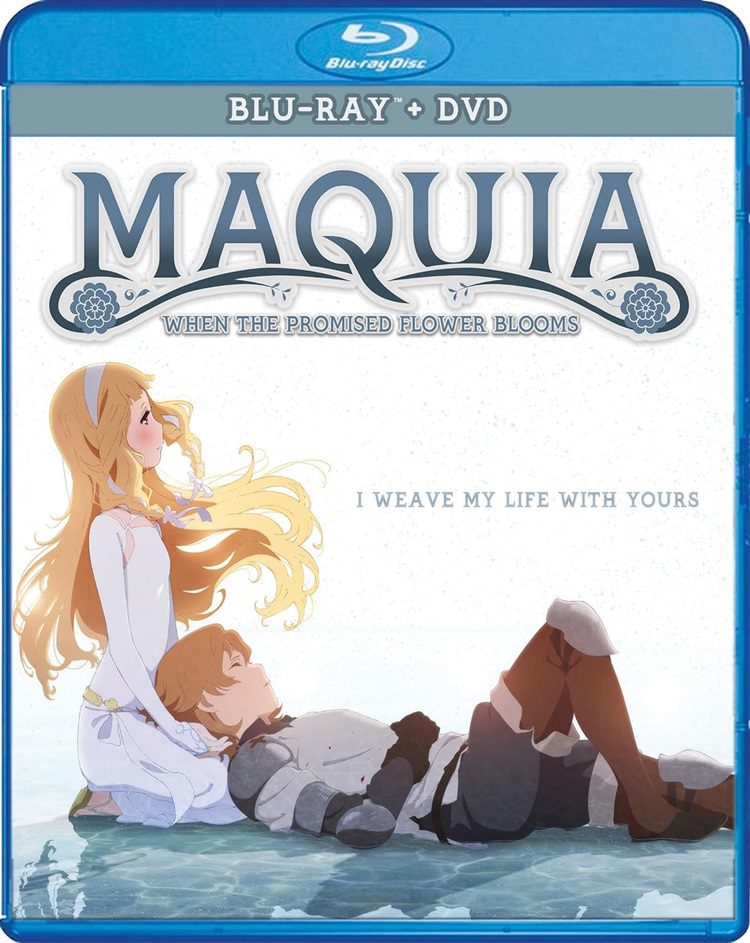
Maquia: When the Promised Flower Blooms is visually stunning, and works hard at it. It opens with the working of a loom on screen, digitally animated. It’s an incredibly detailed bit of mechanical animation, all lit with a white light that makes the images pale and almost translucent. The next image is of a beautiful vista – a white city sitting above a lake, blue water in the foreground and green and white mountains behind. Both shots are detailed, and rendered to be as visually impressive as possible. As the anime characters start appearing among these detailed fore and background images, they almost seem a little off-putting in their lack of detail.
Buy Maquia: When the Promised Flower Blooms Blu-rayEveryone is dressed in pure white cloth, with long blonde hair and slim bodies, so it is nearly impossible to tell the boys from the girls. These are the Iorph, a hidden society of creatures indistinguishable from humans except they live extremely long lives in a state of mostly suspended adolescence. Maquia is one of the youngest and doesn’t have any family line. She lives with “The Elder”, a girl who looks like she is in her mid-teens and is likely thousands of years old. The Iorph have become legends to the outside world, who spend their days weaving on gigantic looms cloth that tell the story of their people. Maquia wonders what it would be like to travel and see more of the world, but she’s warned that nothing but heartbreak and loneliness will come to her if she ever leaves.
Of course, this idyllic world is invaded. A powerful nation who happens to have the world’s only stock of dragons decides it wants to capture all the Iorph as well. They kidnap, kill, and eventually scatter all of Maquia’s people, leaving her abandoned in a forest. There, she finds a human baby, held in the arms of his dead mother, and she decides that it shouldn’t be alone any more than she should, so she rescues it to be its mother… except coming from a society that doesn’t have children being weaned and raised among them, she hasn’t the first clue what to do with a baby.
Maquia: When the Promised Flower Blooms focuses on this poignant story, of a girl who will not age trying to raise an adopted son who just keeps getting older, against the backdrop of more typical anime-fantasy intrigues and plotting. There’s the evil kingdom, where Maquia and the boy Ariel eventually have to live because work is too hard to find elsewhere. She finds a widow with two children of her own to help her out at the start, but because of Maquia’s status as an Iorph, she needs to keep moving as everyone ages around her.
Maquia‘s story oscillates from being about the difficulties of Maquia raising a child on her own in a world that can’t understand her, and into the effects of the Iorph on the world around them. Her best friend Leila had been kidnapped. She’s considered a monster by the royal family, who only want to use her to produce an heir that will have the Iorph longevity. Another surviving Iorph wants to rescue Leila and Maquia from any connection they have with the world, which he sees as contaminating them.
As Ariel grows older, his own relationship with Maquia becomes significantly more complicated. She wants to be his mother, but he isn’t too old before he realizes she’s not, and that she isn’t aging. He begins to tell people she’s his sister, though the men around him suspect they’re unrelated and secretly married. Without delving into tastelessness, or crassness, Maquia dramatizes a clear-eyed view of the entire strange, unsustainable situation, with Ariel’s complicated feelings expressing themselves in distance and occasionally rage.
Despite the focus on family drama, it’s still a fantasy film. There are dragon attacks, soldiers in armor wielding swords, and some scenes of action and violence. (Though the film is unrated, I would give it a solid PG-13 for violence and some of the harsh situations that the characters are placed in.) But the emphasis is less on action and more on how the characters grow and change as life puts them into its different seasons, and how Maquia is outside of that cycle. Not that she doesn’t grow: introduced in the beginning as a crybaby, she is admonished at one point by one of the few human friends she makes that “Mother’s don’t cry”, and she tries to find the inner strength to follow that principle, realized as a promise to Ariel that she’s going to stay strong for him. It’s a simple aspect to the story, but it weaves itself through the narrative in affecting ways, all the way to the story’s emotional climax.
Maquia: When the Promised Flower Blooms, is the first feature film directed by Mari Okada, a long-time anime screenwriter for the production company P.A. Works, who produced this film. It’s an astonishingly accomplished film for a first-timer, both in terms of production values and in the quality of the filmmaking. While not a fast-paced film by any means, it doesn’t have the poky, characters staring at each-other in silence lulls that characterize so much “serious” anime. It’s a heartfelt and poignant film, which explores the implications of its story without maudlin tragedy. It’s sentimental in the end, sure, but it’s an earned sentiment, and an affecting one.
Maquia: When the Promised Flower Blooms has been released on Blu-ray and DVD by Shout! Factory. It includes both the original Japanese audio track as well as an English dub. The disc includes a 22 minute featurette showing some behind the scenes material, including a short Q+A with the producer and the director.